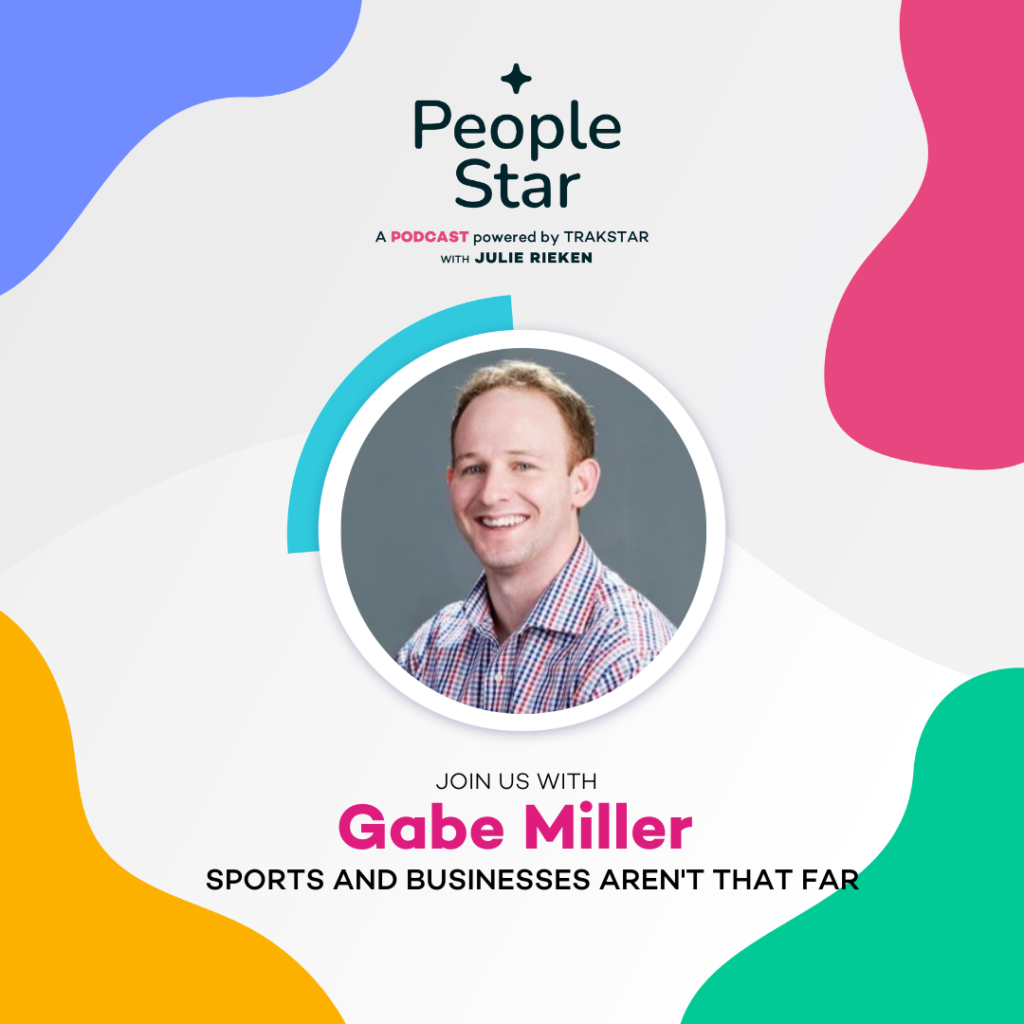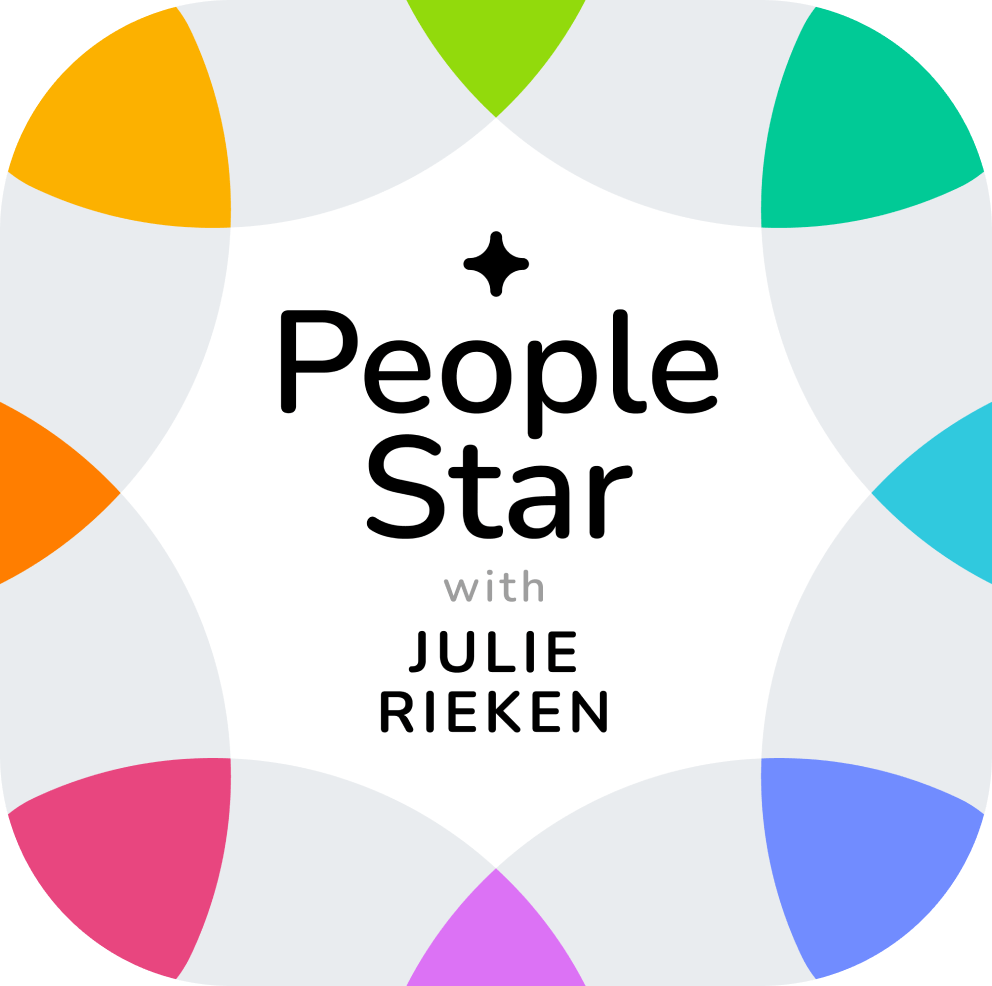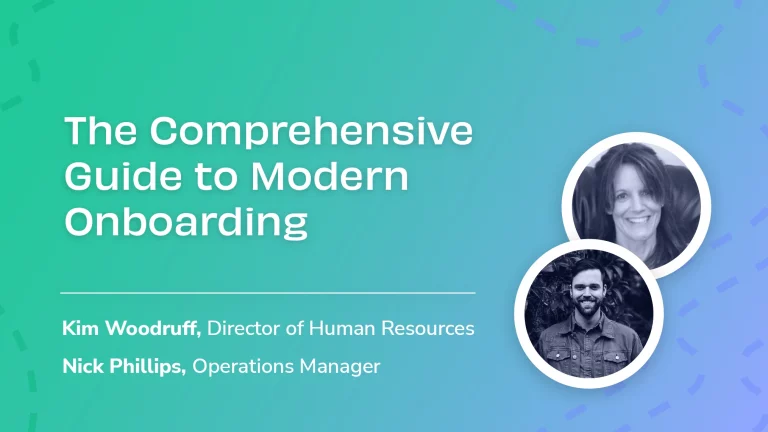PeopleStar Podcast_Gabe Miller: this mp3 audio file was automatically transcribed by Sonix with the best speech-to-text algorithms. This transcript may contain errors.
PeopleStar Podcast Intro:
Welcome to the PeopleStar podcast. We deliver leadership perspectives from industry experts on their people, architecture, routines, and culture as they solve HR's newest challenges. And now your host, Julie Rieken.
Julie Rieken:
Hi, it's Julie Rieken, host of the PeopleStart podcast. I'm super excited today to have Gabe Miller with me. Gabe is out of Chicago and is working on some new projects, and has been focused in his career on being an entrepreneur in startups. And in fact, he has some history with talent response and a non-traditional path to where he's arrived. And so I'm super excited to talk with Gabe today. And Gabe, welcome to the podcast!
Gabe Miller:
Thanks Julie, really excited to be on. Thanks for the invite.
Julie Rieken:
Yeah, I'm really excited, Gabe, about your history. You come out of talent response, you've done different kinds of things focused on startups and entrepreneurship, and I'm wondering, it sounds like you've taken an interesting path to where you are today. Could you tell us a little bit about how you started and how you've become sort of in this path of startups and being an entrepreneur?
Gabe Miller:
Yes, that's a great question. In undergrad, typical to many people, I was on the premed route. So I really wanted to be an orthopedic spine surgeon and was a chemistry and biology double major and quickly realized that wasn't the career path for me and fell in love with microeconomics instead. So really trying to figure out what makes people tick, why do they do what they do? And how can you set up different systems and structures to influence behavior, to create a better system-wide utility across different systems that you're working across. So coming out of undergrad, I wanted to go into consulting and had a few offers that some prominent firms and was about to accept an offer when I saw an opportunity to teach in an inner-city high school just north of Boston. I thought, wow, that sounds really cool. This allows me to do good before doing well. And I think if I were presented the same opportunity later in my life, I wouldn't take it because I would already be invested in a family or my career or whatever it may be. So I taught in an inner-city high school. They spoke Spanish over 90 percent of my lesson plans, which was really humbling because I don't speak Spanish too well, and came out of that year really excited about what I wanted to do next. Went back to the consulting route, thought I wanted to go into consulting again. And then I realized Boston is this great innovation hub. And I think I typed in consulting startup into the LinkedIn search bar and came across a job posting by my co-founder, said he was launching this idea called Talent Response. And I thought, wow, that sounds super interesting. I emailed him, I met him for coffee. And then a week later, we launched Talent Response together. So Talent Response was a talent brokerage for independent consultants with consulting firms, as well as private equity shops, venture capital firms, and large acquisitive tech companies, where our main goal is to help firms implement what we called the agile talent operating models. So how do you incorporate independent consultants into your organization to deliver on strategic value-adding projects? So rather than contracting work out to an Accenture to lead a post-merger integration or waiting for a full-time hire to come on board to lead a lot of that work, why not figure out how you can contract that work out to an independent consultant? So out of Talent Response, we were relatively successful, which is always nice for a startup. And we spun out a venture portfolio of five or six different ventures that we funded with revenues from Talent Response, one of which was a machine learning startup for sourcing across talent acquisition where we wanted to be the Pandora of sourcing. So you would upload a job description, the algorithms would read the job description, and it would present you with twenty-five candidates and you'd give them a thumbs up or thumbs down or a neutral thumb. And then the algorithms would learn from that. And then they would present another twenty-five candidates, you'd go through the same process so that by the time we'd present the universe of two hundred or five hundred or a thousand candidates, they were much more relevant than what the search results on LinkedIn would provide. So we funded a bunch of startups out of Talent Response that all failed. Coming out of Talent Response which was acquired two years ago, I then led marketing out a U-sports marketing startup and then Covid hit. U-Sports weren't playing, marketers weren't being funded. So I was quickly let go. And then I landed at VillageMD, which was a health care unicorn, and did a lot of work across talent strategy and growth strategy, kind of in this weird, ambiguous glob between the two. And then recently left a Village about three weeks ago to not co-found but launch another venture, which I'll be launching this fall.
Gabe Miller:
Gabe, this is a super interesting story. And one of the things that strikes me is the courage that it took to do a couple of things. Number one, you have to be a little courageous just to think Orthopedics surgery is sort of your game, that's number one. Number two, to walk from that and say, OK, I'm going to think about consulting and then I'm going to teach in an inner-city school, and then I'm going to type in a Google search bar, Boston and consulting. Those are some courageous decisions. Can you talk a little bit about what's your makeup? What's your constitution? That allows you to make these courageous decisions and … uncertainty.
Julie Rieken:
Yeah, that's a great question. I think a lot of it revolves around my upbringing and the support structure that I had growing up, where my parents were very supportive in encouraging us to pursue any ambitions or dreams that we had, but also giving us the autonomy to do it in our own way, where we quickly learned how to fail. I think it incorporates into doing some individual sports as well, where I was a big wrestler growing up and loved wrestling. I was mediocre at best, but I was fortunate to wrestle in college. And I think the great thing about wrestling or you mentioned you're a big runner, which I love as well, is that it's up to you regarding how successful you are. And there's nothing more embarrassing than being out there in a singlet in front of a crowded gym and getting your butt kicked. And I think when you put it into perspective, where I've been here before, nothing can be worse when it comes to failing, where, if I do fail, what's the worst that's going to happen? I'm just going to pick myself up and it's up to me to either get better or switch my focus elsewhere. I think perspective really played an important part into that, and then knowing that I had the support structure of my parents, of my teammates and my coaches or whatever it may have been that I was pursuing, really fostered this belief in myself that, you know, it's OK if you go out there and you lose and you lose miserably or it's OK if you put yourself out there and you start a company and you fail miserably because you're always going to be harder on yourself for the risks and the opportunities that you don't take, as opposed to anyone else being hard on you for taking those risks or those opportunities. No one's going to look down on you and say, why did you do that? That was a stupid decision. But you're always going to look back on yourself and say, why didn't I take that step? Or why did I not pursue X, Y, Z? And so I think a lot of it was an upbringing that really influenced that for me.
Julie Rieken:
That's super interesting. And what a wonderful testament to your parents that instilled that in you. And you've thrown down a little gauntlet with the word running. And I am a runner, but I'm always interested in fellow runners. And what, you talked a little bit about how wrestling helped you. Now you're an avid runner and according to your bio, a terrible cook, which I love that too. Can you just tell me a little bit about how are you using the lessons in your running today with this new venture that you're starting? Do you have any connections between those two pieces that help you keep going day-to-day?
Gabe Miller:
Yeah, that's another really good question. I think there are a variety of lessons that you can take from running. The first one being empowerment, where you set your own pace, you set your own distance, and it's up to you to push yourself to reach that next level of what you want to accomplish. And I think that's truly special because there are other aspects of life or sports or whatever you may invest yourself in where you can get carried by other people and not necessarily become complacent, but not necessarily challenge yourself all the time as well. And I think that's truly special about running. Another lesson from running is accountability, where you may set those goals, you may set those paces, but it's up to you and only you to get yourself there. And I think accountability is a great thing when it comes to running because I'm sure you're the same way where you may feel great going into a run and two hours in, you think, oh, this is terrible. I'm not going to be able to make it, or you may not want to go for a run and you actually power through and go for a run. And it's the best thing that happened to you that day. I think from accountability comes routine, where regardless of how you feel, you have to show up and you have to do it because it's going to make you better tomorrow than it did today. I think the most valuable lesson I've learned from running this year especially is listening to signals where, Chicago is a concrete jungle, where the favorite place that I like to run is right along the lakefront, that all the paths are concrete and concrete is killer on my knees and my shins, where even though I like the scenery of what I'm looking at when I'm running along that lakefront, it's not the greatest for me. And so I have to listen to my body to understand, OK, if I push through now, what's the benefit at the end of it? Can I walk the rest of my run and still be OK tomorrow? And really recognizing those signals to rest and to shut off and to say, hey, it's OK if I don't accomplish what I'm looking to accomplish today, because by listening to these signals, to truly stop so I don't get shin splints, I can recover so that I can be better tomorrow. And I think that's important when it comes to business as well, where especially with Covid work-life balance and really hard to draw that line between the two and recognizing I'm going to shut off at this instant today because it's important for my mental health, or whatever it may be. And then the final thing is, anybody can be a good runner, which really excites me. You know, people of all body types, all backgrounds, all athletic abilities, who can be a good run if they set up the right ecosystem and the support structure and empower themselves in the right way where there are ways you make running fun, whether you do it through a team-based environment with like Ragner Relay. There are ways in which you can make running just all about yourself, and it's kind of like your social isolation to say, I want to unplug from the world and go for this run. But anybody can do it as long as they empower themselves and hold themselves accountable. And I think that's the greatest thing about running, where other disciplines like gymnastics or wrestling or swimming or football or soccer, not everyone can be a great athlete in any of those sports, but when it comes to running, everyone can do it. And I think that's the same thing with my philosophy about businesses I hire more based on motivation and what someone brings to the table in terms of what they're looking to do as opposed to what they have done or functional fit or like experience fit to understand, like, OK, yes, this person's been in this role before, they're going to be a great fit. Really looking at like the motivation piece. So I think there are a lot of tangential lessons that running has taught me. I would be curious to hear some of yours. I saw you smile when I mentioned Ragner. Have you done it before?
Julie Rieken:
I haven't. I haven't done that one before. I have a couple of best friends, and when you talk about accountability, it's a really big one for me. We run six days a week together and we run through everything, Gabe, whether its heat pouring down, rain, it doesn't matter, we always say yes, and we're accountable to each other. And I think that's a lesson in business, too, that you're connecting some of those lessons with business. And certainly, that's one that I've learned. And empowerment for me is a big one, too, and that anybody could do it because I don't know that I'm a natural athlete. I'm just stubborn. That's my gift. I'm stubborn. But that's a big deal. You know, that those are lessons that you can take in business and in life, and those are things that I've learned. So some of the things you're saying, not some of them, all of the things you're saying, the lessons that you, that you've learned are things that resonate with me, too. We could talk about this for a long time. It's awesome.
Gabe Miller:
I would love to maybe cook some bad meals over it.
Julie Rieken:
Yeah, that's not a bad idea. Well, Gabe, this has been super fascinating. Thanks for sharing your story and your non-traditional path to where you are. The lessons you've learned from running, how you deal with uncertainty and being courageous. Just really enjoyed our conversation today. Thanks for being on our podcast.
Gabe Miller:
Yes. Thank you so much, Julie. Appreciate the time.
PeopleStar Podcast Outro:
Thanks for listening to the PeopleStar podcast. For the show notes, transcript, resources, and more ways to get a seat at the table, visit us at Trakstar.com/Podcast.
Sonix has many features that you’d love including secure transcription and file storage, automated translation, powerful integrations and APIs, enterprise-grade admin tools, and easily transcribe your Zoom meetings. Try Sonix for free today.




